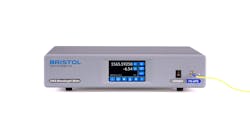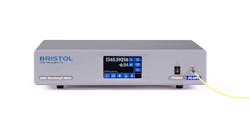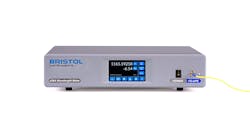AQ6150B Optical Wavelength Meter
The AQ6150B Optical Wavelength Meter is an ideal instrument for accurately measuring the optical wavelength of optical devices and systems with wavelength ranges from 900 nm to 1700 nm. By employing a Michelson interferometer and a high speed Fast Fourier Transform (FFT) algorithm, the AQ6150B can measure not only a single wavelength laser signal, but also a multiple wavelength laser signal from a DWDM system and Fabry-Perot laser. Furthermore, this technology enables the measurement of modulated laser signals in addition to the CW signal from an optical transceiver. The optimized optical design and data processing routine significantly reduces the measurement time and improves manufacturing throughput.
- Wavelength accuracy: ±0.7 ppm
- Wavelength range (3 types): 900-1700nm, 1200-1700nm, 1270-1650nm
- Measurement time of 0.2 seconds or less
- Up to 1024 wavelengths can be measured at once
- Single wavelength type and multi wavelength type
- Support modulated light and filter measurement
Wavelength accuracy of ±0.7 ppm
The standard model AQ6150B offers a ±0.7 ppm accuracy for applications with less demanding requirements, at a more affordable price.
The real time correction feature contribute a highly stable reference signal from the built-in wavelength reference light source in order to provide long-term stability for each and every measurement taken.
CW, modulated transceiver and optical filter measurement
The optical output of optical transceivers and optical transmission systems is modulated with a transmission frequency including 10 G and 25 Gbps. The built-In Optical Spectrum Analysis capability utilizing an FFT technique is required to measure the spectrum broadened by the modulated signal.
In addition to the regular CW light mode, the AQ6150B has a modulated light mode. The modulated mode analyzes the optical spectrum and discovers the center wavelength of the modulated light. This mode can also be used for the center wavelength measurement of optical filters such as a band pass filter, AWG and WSS.
Multi-wavelength type that simultaneously measures up to 1024 wavelengths
The Multi-wavelength type can measure up to 1024 wavelengths in a single input signal with a minimum separation of 5 GHz simultaneously, quickly, and accurately. This means it can meet testing needs in the development and production of WDM transmission system today and in the future as well. The multi-wavelength measurement capability contributes to production efficiency and cost reduction in the production of single-wavelength laser devices as well, by combining multiple laser modules or optical transceivers using an optical coupler and measuring all the signals at once.
Single-wavelength type
Inspection of the wafer and LD chip might be measured only a single wavelength. The single wavelength type is a low-cost optical wavelength meter suitable for such applications.
Delivering high performance even with low-power input signals
Equipped with an Auto Gain Control (AGC) function, the AQ6150B adjusts the gain of the electrical amplifier automatically based on the input signal power. This helps maximize wavelength accuracy and measurement speed even if the input signal power is as low as −40 dBm.
Improve Productivity
Increase throughput with high speed measurement
For the adjustment and characterization of tunable laser sources and tunable optical transceivers requiring hundreds of wavelength measurements per device, high-speed measurement and processing capability are crucial for improving the production throughput.
The AQ6150B can acquire, analyze and transfer a measurement to a PC in less than 0.2 seconds! This is 2 times faster than our AQ6150 model, thus vastly improving production throughput. In the Repeat measurement mode, the AQ6150B can collect 10 measurements per second, making it extremely useful when adjusting a device while monitoring the wavelength in real time.
Upgrade the test system with ease
Easily build an automated measurement system using a remote control interface, ETHERNET or GP-IB.
The remote command set complies with the commonly accepted SCPI industry standard command set for programmable instruments. Thus, the existing measurement system can be easily upgraded without having to change the measurement program if Yokogawa AQ6140 series or another SCPI compatible optical wavelength meter is already in use.
Reduce lifetime ownership costs
With the conventional wavelength meters, the high failure rate of the wavelength reference light source and its high replacement costs have been a major contribution to the overall costs of ownership during the product life cycle, not to mention the costs generated by the downtime itself.
One of our key targets for product design was to address and mitigate as much as possible these issues. We achieved this goal in a multi-dimensional approach as represented graphically in the below scheme.
- Extending the typical lifetime (MTBF) of the light source (Maximize Horizontal scale).
- Reducing the replacement cost (Minimize Vertical scale).
User-friendly interfaces
USB ports
- For USB compatible data storage devices. mouse, and keyboard.
- File function enables users to save data and screenshots to the internal memory or USB storage to use when creating test reports. Screenshots can also be saved by simply pressing the Print Screen button (PRT SCN) located on the front panel.
Easy to view bright color LCD
- The AQ6150B screen design and intuitive is inherited from Yokogawa's best- selling optical spectrum analyzer.
- This interface has been proven by a vast population of users on a global scale in areas such as R&D testing and troubleshooting in manufacturing.
Data access through LAN
The standard LAN port allows convenient access to files stored in the internal memory as well as the ability to remotely update the firmware from a PC.
Direct operation with mouse
- Using a USB mouse makes it easy and intuitive to change measurement conditions, execute an analysis, and modify the optical spectrum view.
- In the optical spectrum view, the waveform view area can be zoomed and shifted by a simple click and drag. The peak threshold line, threshold for peak detection, can also be moved in the same manner.





